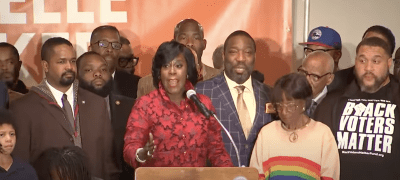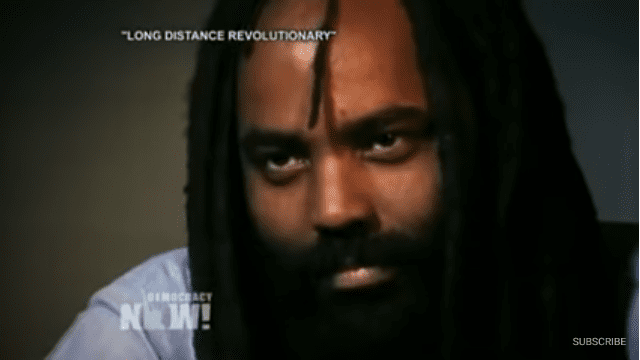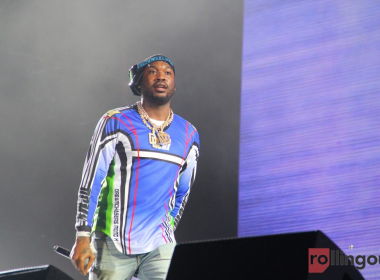 For 30 years, Mumia Abu-Jamal’s murder conviction and pending death sentence for the shooting of Daniel Faulkner, a white police officer, have been the subject of reasonable doubt and furious debate.
For 30 years, Mumia Abu-Jamal’s murder conviction and pending death sentence for the shooting of Daniel Faulkner, a white police officer, have been the subject of reasonable doubt and furious debate.
Abu-Jamal’s case birthed the “Free Mumia” movement, attracting hundreds of vocal supporters around the globe, many of them celebrities.
Poet Maya Angelou and actors Danny Glover, Edward Asner, Alec Baldwin and Tim Robbins were among dozens of famous Abu-Jamal supporters who bought space in The New York Times to call for a new trial. The Beastie Boys played a concert to raise money for Abu-Jamal’s defense.
The now famous death row inmate who is also an author, activist, columnist and radio commentator, has been made an honorary citizen of major cities around the world, including Paris, Montreal and Copenhagen. In Paris, a street in the suburb of Saint-Denis was named Rue Mumia Abu-Jamal in his honor.
Those convinced of Abu-Jamal’s innocence, as well as those who are sure he’s guilty, have watched and waited for 30 years in the hope that the side of the argument they support will win out. Abu-Jamal was originally sentenced to death, and despite years of appeals, the murder conviction has been upheld. But in 2008, a federal appeals court ordered a new sentencing hearing on the grounds that the instructions given to the jury were potentially misleading. Philadelphia prosecutors were then left to decide whether to pursue the death penalty again. They announced their decision on Dec. 7, 2011.
Those who want to see Abu-Jamal’s executed will not be getting their wish.
Philadelphia District Attorney R. Seth Williams announced that prosecutors would no longer seek the death penalty for Abu-Jamal. Although the murder conviction stands, and Abu-Jamal remains incarcerated for life with no possiblity of parole, the “Free Mumia” movement and Abu-Jamal’s supporters around the world are exhaling a collective sigh of relief that he will live to continue his fight for freedom.
Amnesty International, a world-renowned and respected human rights watch group, maintains that Abu-Jamal’s trial was “manifestly unfair and failed to meet international fair trial standards,” and they have expressed that they “continue to believe that justice would best be served by granting Mumia Abu-Jamal a new trial,” said Laura Moye, director of the group’s Campaign to Abolish the Death Penalty.
According to witnesses at the 1982 trial, Abu-Jamal saw his brother scuffle with Faulkner during a 4 a.m. traffic stop on Dec. 9, 1981, and ran toward the scene. Abu-Jamal was wounded by a round from Faulkner’s gun. Faulkner, shot several times, was killed. A .38-caliber gun registered to Abu-Jamal was found at the scene along with five spent shell casings. Tests to confirm that Abu-Jamal had fired the weapon were not performed.
The jury delivered a unanimous guilty verdict after three hours of deliberations.
 The slain officer’s widow, Maureen Faulkner, believes the jury got it right. She lashed out at the judges who overturned Abu-Jamal’s death sentence in 2008, calling them “dishonest cowards, and has vowed to fight any special treatment for Abu-Jamal now that he is no longer on death row. She says she looks forward to him being moved to general population.
The slain officer’s widow, Maureen Faulkner, believes the jury got it right. She lashed out at the judges who overturned Abu-Jamal’s death sentence in 2008, calling them “dishonest cowards, and has vowed to fight any special treatment for Abu-Jamal now that he is no longer on death row. She says she looks forward to him being moved to general population.
“I will not stand by and see him coddled, as he has been in the past,” Faulkner said. “And I am heartened that he will be taken from the protective cloister he has been living in all these years and begin living among his own kind — the thugs and common criminals that infest our prisons.”
Abu-Jamal has an appeal pending before the Pennsylvania Supreme Court over the validity of ballistics evidence.
This case is one of the many excellent examples of why the death penalty cannot be meted out as though it is certain justice, when the evidence is circumstantial and there are conflicting witness testimonies.
Although the Faulkner family is firmly convinced of Abu-Jamal’s guilt, and equally convinced that he should die for the crime, there are countless others out there whose loved ones were killed by a person who got away with murder, while an innocent person served time and was executed for a crime they did not commit.
May justice prevail. –kathleen cross















